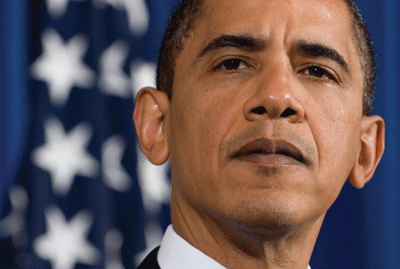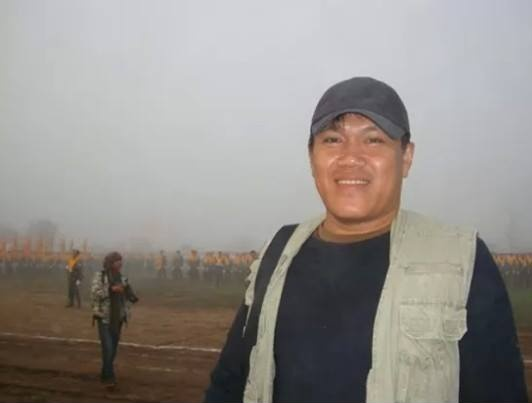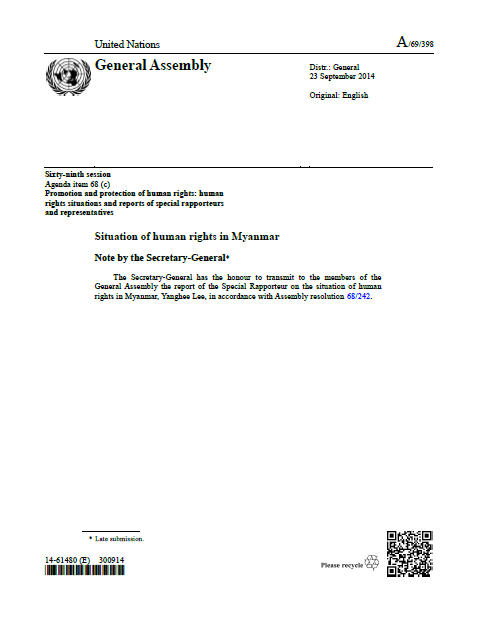Posts Tagged ‘UN General Assembly’ (33 found)
WORLD REPORT 2015
Burma
The reform process in Burma experienced significant slowdowns and in some cases reversals of basic freedoms and democratic progress in 2014. The government continued to pass laws with significant human rights limitations, failed to address calls for constitutional reform ahead of the 2015 elections, and increased arrests of peaceful critics, including land protesters and journalists […]
• • •Statement from First European Rohingya Conference
Europe based Rohingyas held a very first conference in Esbjerg, Denmark from 27th to 28th December 2014. All Rohingya organizations in Europe joined to work collectively for the suffering of Rohingyas in Arakan State and to raise stronger voice against quasi-civilian Burmese government […]
• • •Are You Listening, President Obama?
 US President Barack Obama’s made his much-anticipated second trip to Burma last week during the 25th ASEAN Summit, amid growing awareness that the reforms which he so eagerly celebrated during his 2012 trip are quickly unravelling – or being exposed for the stage-managed charade that they are.
US President Barack Obama’s made his much-anticipated second trip to Burma last week during the 25th ASEAN Summit, amid growing awareness that the reforms which he so eagerly celebrated during his 2012 trip are quickly unravelling – or being exposed for the stage-managed charade that they are.
In 2012, it was all too easy to trust the reform process. National elections had been scheduled for 2015, Daw Aung San Suu Kyi had been freed from house arrest and elected to Parliament, political prisoners had been released, a nationwide ceasefire process was underway with the majority of armed ethnic groups, and restrictions on media and civil society had been drastically loosened. And so the US and the international community embraced the reforms.
Yet, last month, in her recent address to the UN General Assembly, Special Rapporteur on the situation of human rights in Burma Yanghee Lee warned of the risks of backtracking. Then, earlier this month, Daw Aung San Suu Kyi labelled the process as “stalled” and remarked that “there have been times when the [US] government has seemed over-optimistic about the reform process.”
Furthermore, there has been a flurry of recent calls from civil society across Burma, directly raising their various concerns about the reform process with President Obama. The Karen Human Rights Group wrote an open letter drawing President Obama’s attention to human rights violations resulting from the ongoing government military presence throughout south-eastern Burma; […]
• • •Myanmar: UN Human Rights Expert Commends Reforms to Date, but Warns of Risks of Backtracking
NEW YORK / GENEVA (29 October 2014) – The new United Nations Special Rapporteur on the human rights situation in Myanmar, Yanghee Lee, commended the process of reform that has improved the political, economic social and human rights landscape over the past three years, but said that “more is required if gains are to be genuine, sustainable and win the support of the people of Myanmar.” […]
• • •Justice for the Killing of Journalist by Burma Army Must be Found
 News of the murder of a journalist by the Burma Army while being held in custody should send shockwaves across the country and beyond, but sadly it is not much of a surprise for those who are aware of the abusive nature of the most powerful institution in Burma. What will transpire next will be a clear indicator of the Government’s will to pursue justice and end the impunity that the Burma Army has enjoyed for so long. Not many are optimistic.
News of the murder of a journalist by the Burma Army while being held in custody should send shockwaves across the country and beyond, but sadly it is not much of a surprise for those who are aware of the abusive nature of the most powerful institution in Burma. What will transpire next will be a clear indicator of the Government’s will to pursue justice and end the impunity that the Burma Army has enjoyed for so long. Not many are optimistic.
Aung Kyaw Naing, also known as Ko Par Gyi, was a freelance journalist covering the recent clashes in eastern Burma between the Democratic Karen Benevolent Army (DKBA) and the Burma Army and its’ proxy Border Guard Force (BGF). After visiting Kyaikmayaw, Mon State, the scene of heavy clashes in September 2014, Ko Par Gyi went missing. His wife, Ma Than Dar, began to search for him and held a press conference on 21 October in Rangoon stating that he was being held in custody by the Burma Army and demanded his immediate release. Just a few days later, a statement was issued to the Myanmar Press Council (Interim) by an aide to commander-in-chief of the armed forces, Min Aung Hlaing, that detailed Ko Par Gyi’s death while in custody. The statement claims that Ko Par Gyi was a captain for the Klohtoobaw Karen Organization (KKO), the political wing of the DKBA, and was shot dead while trying to escape. The DKBA has denied that Ko Par Gyi was indeed a member of their organization […]
• • •Myanmar: UNGA Resolution Must Address Backtracking on Human Rights
As the new UN Special Rapporteur on the situation of human rights in Myanmar, Yanghee Lee, today presents her first report to the 69thsession of the UN General Assembly (UNGA), Amnesty International calls on the UNGA to adopt a resolution on the country which addresses the government’s backtracking on human rights […]
• • •BURMA: Killing of Mr. Aung Kyaw Naing
The Observatory for the Protection of Human Rights Defenders, a joint programme of the International Federation for Human Rights (FIDH) and the World Organisation Against Torture (OMCT), requests your urgent intervention in the following situation in Burma […]
• • •AAPP (B) Submission to the UN General Assembly
AAPP has submitted a report to the 65th UN General Assembly reminding the Burmese Government of its commitment to signing on to the UN Convention Against Torture (UNCAT). The report references a statement by Deputy Minister of Foreign Affairs Thant Kyaw, who earlier this year announced that Burma would indeed be signing the covenant in September of 2014. However, no such action was taken last month. The reports highlights a number of instances of torture that have occurred thus far in 2014, and concludes by urging the international community to “apply what pressure they can as part of the global effort to afford every human being the right to be free of torture.” […]
• • •UN General Assembly Resolution must Keep the Spotlight on Serious Human Rights Violations
New York, Paris, Bangkok – A UN General Assembly’s Third Committee resolution must continue to address serious human rights violations in Burma, FIDH and its member organization Alternative ASEAN Network on Burma (ALTSEAN-Burma) urged Permanent Missions to the UN during a visit by an FIDH-organized to New-York […]
• • •69th Session of the UN General Assembly – Situation of human rights in Myanmar: Report of the Special Rapporteur on the situation of human rights in Myanmar
I. The mandate of the Special Rapporteur on the situation of human rights in Myanmar was established pursuant to Commission on Human Rights resolution 1992/58 and recently extended by Human Rights Council resolution 25/26. The present report is submitted pursuant to Council resolution 25/26 and General Assembly resolution 68/242.
II. Background
2. Following the completion of the term of the previous mandate holder, the current mandate holder took up her functions only in June 2014, which resulted in a shorter period than usual to conduct a country visit and review the information gathered. The present report therefore sets out the Special Rapporteur’s preliminary observations, to be supplemented by her oral statement to the General Assembly […]
• • •









 All posts
All posts